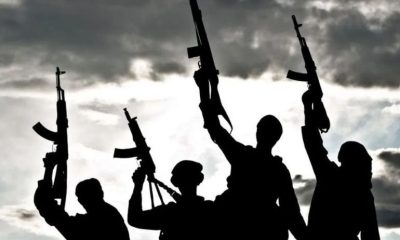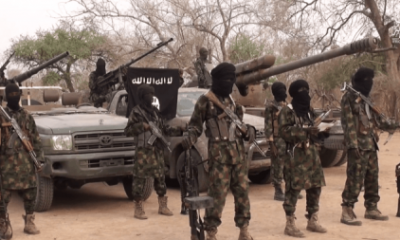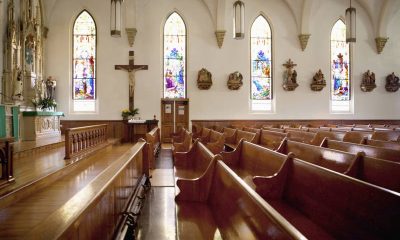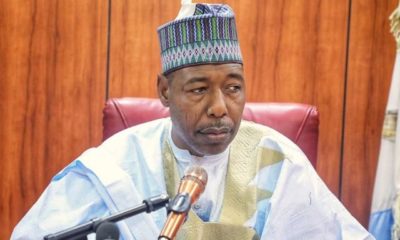News
How Increasing Boko Haram Attacks On Highways Can Cut Borno Off From Nigeria – Report

Fear is now mounting that Borno State may soon be totally cut off from the rest of Nigeria as Boko Haram insurgents in the past few weeks have launched daily attacks on the Kano-Maiduguri highway, the only remaining safe route to the state.
Six highways link Maiduguri, the state capital, with other parts of Nigeria. But for the past six years, only the Kano-Maiduguri highway that connects the state with Damaturu, the Yobe State capital, remains in use.
Between 2013 and late 2014, the insurgents bombed major bridges on four of the highways, rendering the roads inaccessible. They also seized many communities along the highways.
Today, to travel from Maiduguri to Biu, about 180 kilometres in the southern part of the state, commuters now go through Yobe, Bauchi and Gombe states, covering a distance of about 560km.
People travelling to Gwoza, a town 127km south of Maiduguri, also have to make even a longer detour through Adamawa State.
It is even worse for communities in northern Borno. Before the insurgents finally took over the roads leading to Gamboru up to Chad Republic, and the one leading to Mobbar through Gubio up to Niger Republic, travellers, especially fish and hides merchants, made a 360-degree Caravan trip around the Niger Republic through Yobe state before getting back to Maiduguri.
In December 2018, the military reopened most of the roads after “reclaiming” them from Boko Haram.
But it still required heavily armed soldiers to escort long convoys of vehicles to ply the routes. Despite that, travellers and their military escorts suffered a series of fatal ambushes by Boko Haram gunmen.
Today, the “reopened roads” have been abandoned as it has become suicidal to ply them.
Everyone fell back to the only relatively safe road – the Maiduguri-Kano highway – that is known as the “Golden Gate” in the military security circle.
The Maiduguri-Kano highway is guarded by the combined forces of the military, police SARS and Civilian-JTF.
The route did not witness any serious attacks since 2013 when Benisheik, the headquarters of Kaga local government, which is also the main town along the Kano-Maiduguri highway, was badly attacked by Boko Haram which resulted in the death of dozens of villagers and travellers.
Of course, villages like Mainok, Jakana, Ngamdu and Kukareta suffered pockets of attacks between 2014 and 2019. At a point Mainok, a village 10km away from Benisbek, was sacked by Boko Haram; but it was not occupied.
Travellers could then still pass through the village. But the villagers later, on their own, returned to their homes in 2018, signifying how relatively safe the Kano-Maiduguri highway had been.
At Benishek is the only bridge on the 135km distance road between Damaturu, Yobe State capital, and Maiduguri on the Kano-Maiduguri highway. The bridge is guarded by the military round the clock, frustrating many attempts by the insurgents to bomb it.
Since 2012 when the insurgency erupted in full, the bridge remains the only reason why the entire Borno State can be accessed.
The bridge enables goods and services, including deployed military asset and commercial commodities, to get in and out of Maiduguri.
About 90 per cent of the over three million residents of Maiduguri city, who cannot afford air tickets, ply the road.
On the eve of Christmas 2018, Boko Haram staged a deadly ambush near a military checkpoint in Kukareta village of Yobe State , killing 13 soldiers and a police officer. That incident marked the beginning of attacks on the Kano- Maiduguri highway.
On January 7, 2019, Boko Haram launched one of its first major attacks on a military facility in Auno village, killing at least three persons. Auno is about 23 km West of Maiduguri.
Sources in the village said the insurgents had on Friday, January 4, warned the residents to vacate their homes as they would be attacking Jakana, a town 22km away. The warning was not taken seriously.
On July 17, 2019, members of the Islamic State West African Province (ISWAP) faction of the Boko Haram staged an ambush on a military patrol vehicle near Jakana town, killing all the six soldiers, including a colonel, that was on board. That incident signalled the beginning of the escalation of attacks on Borno’s Golden Gate.
In reaction to that embarrassing assault, and in response to the intelligence at its disposal, the military ordered a total evacuation of Jakana to allow soldiers to search the “general area” for Boko Haram fighters. The exercise resulted in the blockage of the busy highway and generated wild reactions from members of the public who condemned the military for abuse of rights.
After weeks of search, the military bowed to pressure and allowed the residents to return to their homes.
The military explained that they had intelligence report that Jakana and nearby villages, especially Mainok, were harbouring Boko Haram fighters.
Weeks later on July 30, 2019, the ISWAP fighters attempted a major attack on Benishek, the seat of Borno’s Golden Bridge, but were swiftly repelled by the Nigeria Air Force jets.
Violence subsided on the highway from August until December 9, 2019, when the insurgents appeared on the Kano-Maiduguri highway, all dressed in full military regalia and driving patrol vehicles painted in desert camouflage colour. The insurgents who stationed their vehicles at a spot near Jakana stopped travellers in a Toyota Hiace 18-sitter bus, pretending to be soldiers.
After asking for their identification cards, two soldiers and a police officer were isolated and killed. The insurgents shared a gory video of the execution, which the military claimed was fake. It was later gathered that other passengers – 11 Christians taken away by the insurgents, were later killed.
On December 19, 2019, the Theatre Commander Operation Lafiya Dole, Mr Adeniyi, a major-general, had in a chat with journalists after a function at the Maimalari Barracks urged the media not to keep quiet about these villages – “Jakana and Auno” because there are lots of Boko Haram sympathisers there. He insisted that the military alone cannot do it.
Days later, sources around Jakana and Auno villages said Boko Haram had threatened to resume massive attacks around the villages as well as Kukareta and Benishek.
“Their aim was to take over the Damaturi-Maiduguri road,” said a source who begged not to be named.
The source said intercepted Whatsapp communications amongst the insurgents indicated that they had mobilised massively to sustain daily attacks on the highway.
It was not clear if the military also had this piece of intelligence.
While residents of Maiduguri celebrated the yuletide in fear for motorists plying the increasingly dangerous highway, the insurgents did not attack until January 4 when ISWAP fighters driving in six gun trucks stormed Jakana and attacked a military base there.
The insurgents, who were targeting mainly soldiers, forced the troops on the ground to retreat even as they killed four soldiers and injured 11 others. But ISWAP had, in a website popular for reporting ISIS news, claimed 30 soldiers were killed in the Jakana attack.
The attack on Jakana forced the military to return to its search operation around the communities of Auno, Jakana and Mainok villages.
The exercise which involved blockade of the highway caused serious concern for motorists who continued to queue up in the bush. The situation later degenerated to some form of confrontation between the military and the Borno State governor over the alleged plan by soldiers to evacuate the entire residents of Jakana and Mainok to an IDP camp in Maiduguri.
Governor Babagana Zulum had to rush to Mainok and Jakana on January 7, 2020 stop the evacuation of the residents.
The previous day, Mr Adeniyi had escaped a deadly ambush by ISWAP fighters who riddled his vehicle with bullets. It was said that his driver got hit by a bullet.
For that reason, the military decided that evacuating Jakana and Mainok towns was imperative. But the governor did not share that operational view.
To him, the decision was rather rash and was not consistent with procedures of moving people to IDP camp.
Above all, Governor Zulum had argued that evacuation the villages was as good as shutting down and militarising the Maidugiri-Kano road, which is the state’s only link to Borno.
On January 9, at about 3.35 p.m, the insurgents staged yet another ambush on travellers on the outskirts of Auno, 23km away from Maiduguri. They stopped a Volkswagen salon car and an 18-seater bus and took seven of the travellers away.
The next day, the state government issued 70 brand new Toyota Hilux vans to a joint security committee for the patrol of the highways.
Though the donation of these security patrol vehicles was greeted with excitement in Borno, the insurgents had continued to attack the highway almost on a daily basis.
Between January 13 and 16, the insurgents had carried out several attacks and abduction of travellers, including eight students of the University of Maiduguri. One of the students who was later released said the insurgents took him and others away and later returned to a location near Auno after he had lied to them that he was a student of Arabic Language.
Last Saturday, security sources around Jakana and Mainok said the insurgents carried out three attacks at a spot between the two communities.
“In each of the attacks, they made sure they abducted travellers,” said a security source.
“What is even baffling is that they used the same locations each time they come out for an ambush,” the source said.
“There are cattle routes between Jakana and Mainok, as well as between Mainok and Benishek. These are the routes they normally use driving their Hilux gun trucks, ” said the security source who craved anonymity.
The governor of Borno State had on January 10 distributed 70 new vans to a joint patrol committee for patrol of highways in the state.
According to Governor Zulum, the 70 new vehicles are for the military and security outfits for surveillance operations.
Mr Zulum said his administration “will not hesitate to take any measure or make any sacrifice in order to ensure peace and security return to our state.”
He said: “As the chief security officer of Borno State, it is my constitutional and moral responsibility to do whatever I possibly can in trying to secure the lives of citizens and doing that, is the whole essence of government in the first place.”
The government earlier last year gave out 90 vans to the military, bringing its recent donations to 160 patrol vans.
But despite this massive investment in the security sector, the attacks went on without any sign of reducing. The ISWAP gunmen carried out more attacks between 10 January when the vehicles were released and last weekend.
Already, the activity of the ISWAP gunmen on the highway has begun to take a toll on the local economy of Maiduguri, just as it is affecting trades between Borno, Yobe and Kano states.
Husseini Abba Kyari, a textile merchant in Maiduguri who makes his bulk purchases from Kano, said, “the insecurity on the Kano-Maiduguri highway, especially between Damaturu and Maiduguri, has already affected my business.
“I had the intention of travelling to Kano since December last year, but here I am stranded because there is no guarantee of security on the way in or out of Maiduguri. I’m very worried because very soon I will run out of stock.”
Mallam Jidda, a major car dealer in Maiduguri, said the attacks on the Kano-Maiduguri highway have “badly affected” the business of car selling in Borno state.
According to him, the business has crumbled by “90 per cent”.
“We are in a dicey situation economically in Borno state, ” he lamented.
“What do you make of a situation where out of 100 businessmen that go out to bring cars for sales, only about 10 now have the courage to do so due to insecurity?
“Our kind if the business is 100 per cent dependent on the road. But now the only road available for us to transit our business is being taken over. Everyone fears for his or her life. The attacks are spontaneous and they are dangerous as well.
Mr Jidda said the crippling of the car dealership business has a huge ripple effect on its value chain.
“A well-established car sales garage has at least 50 persons depending on it for their daily bread. Yes! We have people who wash and polish cars, we have mechanics, receptionists, automobile electricians, spare parts vendors; we have all tribes depending on the business to survive. But it now means nothing for this multitude of beneficiaries if we can no longer bring into Maiduguri cars for sale.
“Government must rise up and do the needful urgently in order to save the Maiduguri road from being totally taken, else we would have a poor economy and poverty-stricken people to contend with in a society already battling to fight back an insurgency that was created largely by poverty, ” said Mr Jidda.
Civil society groups in Yobe State had on Monday bewailed the deplorable state of insecurity on the highways linking Borno and Yobe states.
The group said in a statement issued to the media that it “observes with total dismay, the growing insecurity in the Northeast in recent weeks, especially on the Damaturu-Maiduguri Highway.
“Innocent travellers are brutally killed on a daily basis yet, the government chose to be almost in total silence without a proactive measure to curtail such.”
The groups said they, as citizens, had done more in areas of support and intelligence sharing, sometimes at the risk of their lives, but the government seemed not to be doing its part.
“It seems our lives are taken for granted by (government) tolerating insurgents to continually feast on us, ” they said.
“The government should equally remind itself that our priority needs from her is SECURITY, which it has not done enough to provide, but succeeded in making citizens lose confidence in their sincerity in that direction.”
While making comments on recent issues surrounding the operations of the UN system and INGOs in the Northeast, the UN Humanitarian Coordinator in Nigeria, Edward Kallon, also lamented the worsening insecurity on Borno state highways.
“I am extremely worried by the increasingly insecure environment that humanitarians are working in to provide urgent and vital assistance to civilians affected by the crisis, ” he said.
“The the humanitarian community is troubled by the increasing trend in vehicular checkpoints set up by non-state armed groups along main supply routes in the states of Borno and Yobe.
“These checkpoints expose civilians and humanitarians to heightened risks of being killed or abducted. I urge all parties to the conflict to protect the civilian population, including aid workers, from such grave violations of international laws, especially women and children who are among the most vulnerable and are caught up in the violence.”
The Nigerian Union of Journalists also decried the absence of safety on the highway between Borno and Yobe states.
Northeast Zonal Vice President of the NUJ, Alhassan Haruna, told journalists on Tuesday to step up reportage about the security situation of the only road that leads to Borno state.
“We are calling on President, Muhammadu Buhari to cut short his stay in the UK and return home and address the pathetic situation in the Northeast, ” he said.
“A responsible government should not wait and fold it’s armed, watching citizens being killed and abducted on a daily basis on a highway that is said to be guarded by armed soldiers and police.
”It is unacceptable in this advance era for government to leave its a citizen at the mercy of terrorists. It is unheard of that the only road to state as big as Borno cannot be protected for the ordinary populace who have never asked for anything more than the freedom to move and right to be protected, ” said Mr Haruna.
Despite the attacks and abductions by armed groups on the highways of Borno, which in this year alone has claimed dozens of lives (both military and civilians) and got scores of the persons into captivity, the military command insists all is well.
Mr Adeniyi told journalists Monday evening that, as far as he was concerned, the route linking Maiduguri and Damaturu is very safe.
“I had just supervised the military escort of Jerusalem Christian pilgrims through the highway from Damaturu to Maiduguri,” he said.
Though the Theatre Commander said the highway is safe for motorists, it was the first time in a long time that pilgrims were given military escort from Damaturu to Maiduguri.
Governor Zulum two weeks ago begged the Federal government to ensure that the military does not shut down the Maiduguri-Kano highway. But it seems that if the government fails to address the problem, the road may soon be in the hands of the insurgents.
President Buhari had in May 2015 promised to end Boko Haram and improve the security situation in the Northeast. It is now clear from the current state of insecurity that the promise is far from fulfilled.
• EmergencyDigest
-

 News4 days ago
News4 days agoInsecurity: Kogi Schools Resume On Monday
-

 Opinion4 days ago
Opinion4 days agoDon’t Pull the Plug: Why Nigerians Are Pleading for the U.S. to Extend Its Police Training Program — and Why It Must Synergize With New Military Arrivals
-

 Crime3 days ago
Crime3 days agoVigilante Reportedly Shoots Colleague Dead In Plateau
-

 Crime4 days ago
Crime4 days agoMan Shot Dead In Ambush Along Jol-Sho Road In Plateau












